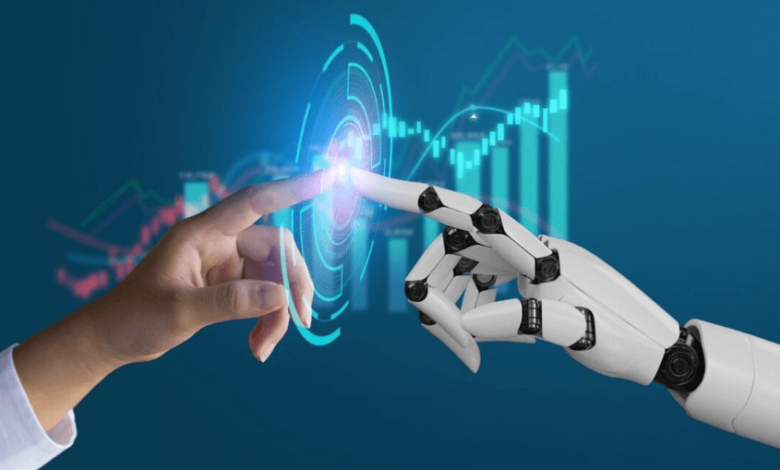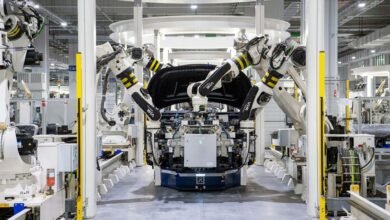The Future of AI: How Artificial Intelligence is Shaping Our World

Introduction
The rapid advancement of artificial intelligence (AI) is reshaping nearly every facet of human existence. From the way we work to the way we interact with technology, AI is not just a buzzword anymore—it’s a key driver of innovation. As we look to the future, the question arises: How will AI continue to influence our world? This article delves into the future of AI, exploring its impact on various industries, ethical considerations, and the potential challenges we must address as we embrace this technological revolution.
1. What is Artificial Intelligence?
Artificial Intelligence refers to the simulation of human intelligence in machines that are programmed to think and act like humans. AI can perform tasks such as decision-making, problem-solving, language understanding, and visual perception. Machine learning (ML) and deep learning (DL) are subsets of AI that focus on enabling machines to improve their performance over time by learning from data.
2. The Growing Role of AI in Healthcare
AI is making significant strides in the healthcare industry. From diagnostics to personalized medicine, AI is enhancing the accuracy and efficiency of medical practices.
- AI in Diagnostics: AI-powered tools are now being used to analyze medical images, detect diseases such as cancer, and predict patient outcomes with remarkable precision. Machine learning algorithms can analyze vast amounts of medical data, identifying patterns and offering early warning signs that may be missed by human doctors.
- Personalized Medicine: AI is helping healthcare professionals tailor treatments to individual patients. By analyzing a patient’s genetic makeup and health history, AI can recommend personalized therapies that are more likely to be effective.
- Drug Discovery: AI accelerates the drug discovery process by predicting how different compounds will interact with human cells. This speeds up the development of new medications and treatments for various conditions, including chronic illnesses and rare diseases.
See also: rainmakerless
3. AI and the Future of Education
AI is revolutionizing the way we learn. With the increasing demand for personalized learning experiences, AI is helping to tailor education to individual needs.
- Personalized Learning: AI can adapt the learning pace and content based on a student’s abilities, strengths, and weaknesses. This customization ensures that each student gets the attention they need to succeed.
- Virtual Tutors and Assistants: AI-powered virtual tutors and assistants are helping students with homework, answering questions, and providing feedback on assignments. This allows for more interactive and engaging learning experiences, even outside of the classroom.
- Administrative Efficiency: AI is also streamlining administrative tasks, from scheduling to grading, allowing educators to focus more on teaching and less on paperwork.
4. AI in Business and Automation
Businesses are harnessing AI to improve operations, enhance customer experiences, and drive innovation.
- Customer Service: AI chatbots and virtual assistants are transforming customer service by providing 24/7 support, answering queries, and resolving issues quickly and efficiently. They can handle a large volume of interactions, reducing wait times and increasing customer satisfaction.
- Automation: AI-driven automation tools are taking over repetitive and mundane tasks, such as data entry, inventory management, and even complex processes like financial forecasting. This allows human workers to focus on higher-level tasks that require creativity and problem-solving.
- Predictive Analytics: AI-powered predictive analytics tools help businesses make data-driven decisions. By analyzing historical data, these tools can forecast trends, customer behavior, and market shifts, allowing companies to stay ahead of the curve.
5. Ethical Considerations in AI Development
As AI continues to evolve, ethical concerns are at the forefront of discussions. Key considerations include:
- Bias and Fairness: AI algorithms can inherit biases present in the data they are trained on. If not properly addressed, these biases can lead to unfair outcomes, especially in critical areas like hiring, lending, and law enforcement.
- Privacy: The collection and analysis of personal data by AI systems raise significant privacy concerns. Ensuring that AI operates in a transparent and secure manner is crucial to gaining public trust.
- Job Displacement: The rise of AI-driven automation threatens to displace jobs in various industries, particularly in fields that rely on repetitive tasks. This raises important questions about the future of work and the need for reskilling programs to help workers transition to new roles.
6. AI and the Workforce: Creating New Opportunities
While AI may eliminate some jobs, it is also creating new opportunities. As AI technology advances, so does the demand for workers skilled in fields such as data science, machine learning, and AI ethics.
- New Careers: The rise of AI is opening up new career paths in industries such as AI development, cybersecurity, and robotics. These roles require specialized knowledge and skills, providing new opportunities for workers to upskill and adapt.
- AI as a Collaborative Tool: Rather than replacing human workers, AI can serve as a collaborative tool, enhancing the productivity and capabilities of employees. For example, AI can assist doctors in diagnosing patients or help engineers design more efficient systems.
7. AI in Transportation: Revolutionizing Mobility
AI is revolutionizing the transportation sector by enabling autonomous vehicles, improving traffic management, and enhancing safety.
- Autonomous Vehicles: Self-driving cars and trucks are poised to transform how we travel and transport goods. These vehicles use AI to navigate roads, detect obstacles, and make decisions in real-time, potentially reducing accidents caused by human error.
- Smart Traffic Management: AI-powered traffic management systems can optimize traffic flow, reduce congestion, and improve road safety. These systems use real-time data from sensors, cameras, and GPS to adjust traffic signals and prevent bottlenecks.
8. AI in Entertainment and Media
AI is also transforming the entertainment industry by enhancing content creation, personalized recommendations, and user engagement.
- Content Creation: AI is being used to create music, art, and even movies. AI algorithms can generate realistic images, compose music, and write scripts, enabling faster and more efficient production.
- Personalized Recommendations: AI-powered recommendation systems are widely used by platforms like Netflix, Spotify, and YouTube to suggest content based on user preferences and viewing history. This enhances the user experience and keeps audiences engaged.
9. The Role of AI in Environmental Sustainability
AI is playing a critical role in addressing environmental challenges, from climate change to resource conservation.
- Energy Efficiency: AI systems can optimize energy consumption in buildings, factories, and transportation systems. By analyzing data on energy use, AI can recommend ways to reduce waste and improve efficiency.
- Climate Modeling: AI is being used to create more accurate climate models, helping scientists predict future environmental changes and develop strategies for mitigating their impact.
- Wildlife Conservation: AI-powered drones and cameras are being used to monitor wildlife populations, track poaching activities, and gather data on endangered species.
10. The Future of AI: What Lies Ahead
The future of AI holds incredible promise, but it also presents significant challenges. As AI continues to evolve, it will likely have an even greater impact on our daily lives, shaping industries, economies, and societies. The key to a successful AI-driven future will be balancing innovation with ethical considerations and ensuring that AI serves the common good.
Frequently Asked Questions (FAQs)
1. What is the future of artificial intelligence?
The future of AI is promising, with advancements in areas like healthcare, transportation, business, and entertainment. AI is expected to become more integrated into everyday life, transforming industries and creating new opportunities.
2. How is AI used in healthcare?
AI is used in healthcare for diagnostics, personalized medicine, and drug discovery. AI can analyze medical data to detect diseases and recommend treatments tailored to individual patients.
3. Can AI replace human workers?
While AI may automate certain tasks, it is more likely to serve as a tool that complements human workers. It creates new opportunities and enables workers to focus on higher-level, creative tasks.
4. What ethical concerns surround AI?
Ethical concerns surrounding AI include bias in algorithms, privacy issues, and the potential for job displacement. Addressing these concerns is crucial for the responsible development of AI.
5. How is AI used in transportation?
AI is used in transportation for autonomous vehicles, smart traffic management, and improving safety. Self-driving cars and AI-powered traffic systems are expected to revolutionize how we travel.
6. Is AI the future of entertainment?
Yes, AI is transforming the entertainment industry by enhancing content creation, personalizing recommendations, and improving user engagement. AI is already being used to generate music, art, and even movies.
Conclusion
The future of AI is full of potential, offering solutions to some of the world’s most pressing problems while transforming industries across the board. From healthcare to entertainment, AI is reshaping how we live, work, and interact with the world. As we move forward, the challenge will be ensuring that AI develops ethically and responsibly, benefiting society as a whole. By addressing ethical concerns and fostering innovation, we can unlock the full potential of AI and shape a brighter future for all.





